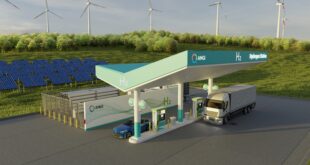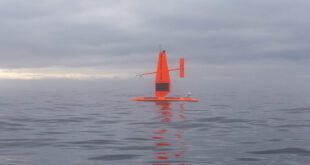Cements partnership with State of California on onshore, offshore clean energy development; Approves two transmission lines to deliver energy across Southwest
WASHINGTON – As part of President Obama’s Climate Action Plan to cut carbon pollution and create clean energy jobs, U.S. Secretary of the Interior Sally Jewell today announced new steps with Western states to encourage the development of renewable power, efficiently deliver that electricity to market, and meet growing consumer demands for clean energy.
Under a Memorandum of Understanding (MOU) Secretary Jewell signed with California Governor Edmund G. Brown Jr., the Interior Department and state agencies will work collaboratively on expanded and streamlined efforts to encourage the timely and responsible development of renewable energy projects on federal and state lands and offshore waters.
Jewell also announced approval of two major transmission line projects developed in consultation with several states that will distribute up to 4,500 megawatts of renewable power across the Mountain West, Desert Southwest and California.
“These efforts strengthen our commitment to work with state and local communities to unlock the West’s abundant renewable energy resources, create jobs and support development that makes sense for both the economy and the environment,” said Secretary Jewell. “Together, these initiatives will generate thousands of construction and operations jobs, cut carbon emissions by millions of tons, and help Western states meet their renewable energy goals.”
“We will continue to transition from the fossil fuels of the past to the renewable energy of the future,” said Governor Brown. “With this agreement, we’re harnessing California’s bountiful sun, wind and waves to generate the energy we need.”
The MOU establishes specific objectives for onshore and offshore renewable energy development on federal and state lands and waters, directing Interior and California agencies to take the necessary actions to achieve these goals. A high priority is placed on processing applications for renewable energy projects in areas that minimize environmental effects, make efficient use of existing transmission systems and are consistent with ongoing cooperative planning efforts, such the Desert Renewable Energy Conservation Plan, Western Solar Plan, and the Renewable Energy Transmission Initiative.
Applications for projects in Federal offshore waters identified as Wind Energy Areas would also be accorded priority consideration by the joint Intergovernmental Renewable Energy Task Force established by Interior’s Bureau of Ocean Energy Management and California officials. The Task Force will expedite offshore renewable energy by advancing collaborative planning, conservation through data sharing, development and utilization of common data platforms and tools, and proactive stakeholder engagement.
Since there are significant renewable energy resources in the Western United States that are in less populated areas, a key component of facilitating renewable energy development is providing transmission capacity to move that power to demand centers. The two lines approved today respond to that need. The 416-mile Energy Gateway South transmission project will carry up to 1,500 megawatts and cross 228 miles of public land administered by Interior’s Bureau of Land Management (BLM) in Utah, Colorado and Wyoming. TransWest Express, a 728-mile line that crosses 442 miles of BLM public land, would deliver up to 3,000 megawatts – enough energy to power up to 1.8 million homes – from southcentral Wyoming to southern Nevada. The transmission lines will also minimize impacts on Greater Sage-grouse and other sensitive avian habitat through specific design features and compensatory mitigation.
Both projects are co-located with existing transmission lines and roads to the maximum extent possible to reduce overall ground disturbance and visual impacts. Their construction is expected to generate more than 2,300 jobs in the West. Route maps are available at http://bit.ly/TransWestExpress
These initiatives build on the Department’s efforts over the past eight years to work with state and local leaders to tap the West’s wealth of renewable energy resources. The Interior Department has approved 60 utility-scale projects, including 36 solar, 11 wind and 13 geothermal proposals. Combined, these projects represent $40 billion in potential private capital investments that could support more than 26,000 construction and operations job and generate more than 15,500 megawatts – enough to power approximately five million homes across the West.
To help get that clean power to market, the Obama Administration also made transmission lines a presidential priority in 2009; since then Interior has approved 54 such projects, spanning 4,200 miles, to help unlock wind and solar resources that cannot be currently accessed due to lack of infrastructure to bring energy to the grid.
California’s goal of meeting 50 percent of the state’s electrical needs with renewable energy sources by 2030 will require a substantial increase in the development of qualified energy projects, such as onshore and offshore wind, solar, geothermal, offshore wave and biomass. These projects also will contribute to the State’s climate change goals of reducing greenhouse gases to 40 percent below 1990 levels by 2030; and help the State achieve the health-based air quality standards of the Clean Air Act.
 Alternative Energy HQ solar power for homes, wind energy, and bio fuel issues
Alternative Energy HQ solar power for homes, wind energy, and bio fuel issues






